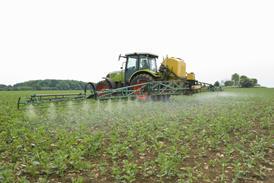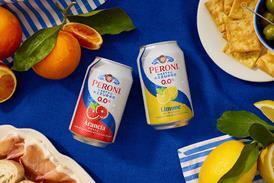>>Chris Tyas, Nestlé supply chain director UK and IRELAND and BCCCA commercial chairman, on sugar regime reform
The UK has a proud history of food manufacturing. The industrial sugar market in the UK, including confectionery and soft drinks, has product sales worth more than £15bn. In fact, the UK is home to two of the world’s largest chocolate factories.
However, our status as a world leader is being eroded by an archaic sugar supply regime. Sugar for UK manufacturers is the most expensive in the world: as a result of the tariff system, we pay three times the world price for sugar and 10% more than the price paid in continental Europe.
Until recently the confectionery industry had a positive trade balance, exporting more than it was importing. But in 2002 the balance moved into the red as a direct result of Britain’s competitiveness being undermined. For instance, manufacturers that set up factories on the fringes of the EU can import products into the community at much lower prices than can be made in Britain or France and Germany.
The impact on the UK workforce is significant. For some years industrial sugar users have been haemorrhaging jobs at an increasingly faster rate. An independent study for the Biscuit Cake Chocolate and Confectionery Association (BCCCA) found that the exceedingly high price of sugar has significantly contributed to the loss of more than 20% of the workforce in the sector in the past five years alone. Currently this sector directly employs 60,000 people.
The regime also results in ludicrous situations. For example, in order to stabilise the market ahead of the reform, the need to comply with a World Trade Organisation ruling has forced the EU to dump a large volume of excess sugar production (known as C sugar) outside the EU. This dumping, along with the price of sugar, can result in sugar grown in Yorkshire being cheaper to buy in Singapore than in the UK itself.
European Commission proposals for reform are now under discussion. This is crunch time for much of the European food chain. The reform will impact not only on UK manufacturing, but also on processors and producers. As the proposals currently stand, there are a number of serious oversights. In particular, the reform does not reflect which countries are more efficient producers of sugar. In the proposed reform, the country national quota system will remain in place; this means that countries that are less efficient sugar producers will
still be encouraged to produce sugar. The solution is to make production quotas tradeable, as this would allow countries to focus on the agricultural produce most suited to their environmental conditions and skills base. This would be good news for UK farmers, who are among the most efficient in the EU in sugar beet farming.
If we are to avoid the slow death of our industrial base, this reform needs to be speedy. Any reform needs to give affected parties time to adjust, but as this reform has been in discussion for around 10 years, it is time to move quickly towards a resolution.
Under the current proposals, the UK manufacturing industry will not see effective price cuts until October 2007. However, we need effective price cuts by July 2006.
Compensation schemes need to be just. The current proposal is that industrial users of sugar and consumers compensate private shareholder processing companies. This would be same as expecting supermarket chains to compensate the slaughter houses when they were reformed by the EU.
We also need to see firm proposals on how the developing countries that currently benefit from the sugar regime are helped to readjust, as this is still unclear. This is not just a manufacturing problem, it is also a processors’ and national problem because, without products being made in the UK, there is no industrial market for sugar or other ingredients. This has huge implications for farmers and country livelihoods.
The UK government currently has the presidency of the EU council and should take this opportunity to drive through effective reform, securing the future of UK food manufacturing and farming.
The UK has a proud history of food manufacturing. The industrial sugar market in the UK, including confectionery and soft drinks, has product sales worth more than £15bn. In fact, the UK is home to two of the world’s largest chocolate factories.
However, our status as a world leader is being eroded by an archaic sugar supply regime. Sugar for UK manufacturers is the most expensive in the world: as a result of the tariff system, we pay three times the world price for sugar and 10% more than the price paid in continental Europe.
Until recently the confectionery industry had a positive trade balance, exporting more than it was importing. But in 2002 the balance moved into the red as a direct result of Britain’s competitiveness being undermined. For instance, manufacturers that set up factories on the fringes of the EU can import products into the community at much lower prices than can be made in Britain or France and Germany.
The impact on the UK workforce is significant. For some years industrial sugar users have been haemorrhaging jobs at an increasingly faster rate. An independent study for the Biscuit Cake Chocolate and Confectionery Association (BCCCA) found that the exceedingly high price of sugar has significantly contributed to the loss of more than 20% of the workforce in the sector in the past five years alone. Currently this sector directly employs 60,000 people.
The regime also results in ludicrous situations. For example, in order to stabilise the market ahead of the reform, the need to comply with a World Trade Organisation ruling has forced the EU to dump a large volume of excess sugar production (known as C sugar) outside the EU. This dumping, along with the price of sugar, can result in sugar grown in Yorkshire being cheaper to buy in Singapore than in the UK itself.
European Commission proposals for reform are now under discussion. This is crunch time for much of the European food chain. The reform will impact not only on UK manufacturing, but also on processors and producers. As the proposals currently stand, there are a number of serious oversights. In particular, the reform does not reflect which countries are more efficient producers of sugar. In the proposed reform, the country national quota system will remain in place; this means that countries that are less efficient sugar producers will
still be encouraged to produce sugar. The solution is to make production quotas tradeable, as this would allow countries to focus on the agricultural produce most suited to their environmental conditions and skills base. This would be good news for UK farmers, who are among the most efficient in the EU in sugar beet farming.
If we are to avoid the slow death of our industrial base, this reform needs to be speedy. Any reform needs to give affected parties time to adjust, but as this reform has been in discussion for around 10 years, it is time to move quickly towards a resolution.
Under the current proposals, the UK manufacturing industry will not see effective price cuts until October 2007. However, we need effective price cuts by July 2006.
Compensation schemes need to be just. The current proposal is that industrial users of sugar and consumers compensate private shareholder processing companies. This would be same as expecting supermarket chains to compensate the slaughter houses when they were reformed by the EU.
We also need to see firm proposals on how the developing countries that currently benefit from the sugar regime are helped to readjust, as this is still unclear. This is not just a manufacturing problem, it is also a processors’ and national problem because, without products being made in the UK, there is no industrial market for sugar or other ingredients. This has huge implications for farmers and country livelihoods.
The UK government currently has the presidency of the EU council and should take this opportunity to drive through effective reform, securing the future of UK food manufacturing and farming.













No comments yet